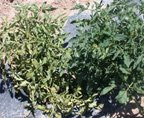
CACTUS CLUB FORMING IN PRESCOTT AREA
A local cactus club is forming in the greater Prescott area. Membership is open to anyone interested in growing, observing or photographing cacti and other succulents (including agaves, aloes, euphorbias, sedums, and yuccas).
The idea for a club originated with a program on cold hardy succulents given by Gene Twaronite, Instructional Specialist with the Yavapai County Cooperative Extension. A number of people at the program suggested forming a cactus club for this region.
The club as envisioned, according to Twaronite, would be informal, meeting perhaps once a month at various home gardens. The main purpose would be to bring together cactus lovers of all ages and backgrounds to share their knowledge, cuttings, and gardens with others. As the club progresses, there might also be occasional guest speakers or field trips to local natural areas to view some of our native succulents.
When not teaching about Firewise landscaping to area residents, Twaronite is an avid cactus and succulent enthusiast, who grows and displays many different species in his five acre wild garden in west Chino Valley.
Anyone interested in a local cactus club is invited to call Gene Twaronite (928 445-6590 ex. 231 or e-mail (twaronit@cals.arizona.edu).



























